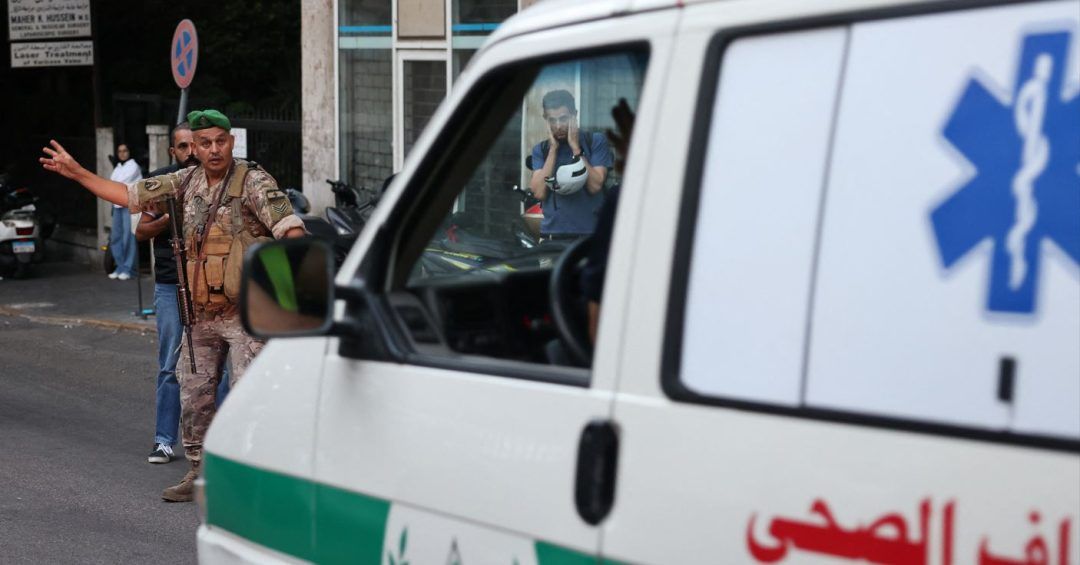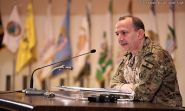
©(Photo by ANWAR AMRO / AFP)
Eleven people, including the son of Hezbollah MP Ali Ammar, were killed and 4000, mostly Hezbollah members (according to an initial assessment), as well as the Iranian ambassador to Beirut, Mojtaba Amani, were simultaneously injured across Lebanon on Tuesday in an unprecedented Israeli technological attack targeting their Pagers, according to the Ministry of Public Health.
Among the wounded, at least 400 were in critical conditions.
Hezbollah accused Israel, vowing "punishment" for the unprecedented technological attack.
Among the killed were Fatima Jaafar Abdallah, a 10-year-old girl who was near her father when his Pager exploded, and Hussein Ayoub Fakih and Hussein Mantach, members of the pro-Iranian group. The identity of the other victims has not been revealed.
Bodyguards of Hezbollah’s Secretary General have also been wounded in the explosion of their pagers.
The wounded also included the sons of MP Hassan Fadlallah and Wafic Safa, head of the Hezb coordination unit, according to as yet unconfirmed reports.
Israel used state-of-the-art technology to remotely detonate the batteries of the pagers, used by Hezbollah operatives to replace cell phones, in order to reduce the risk of being traced and located by Israel.
In a statement issued a few hours after the attack, Hezbollah announced that it had opened an investigation to determine the circumstances surrounding the simultaneous explosions. In a second statement, it blamed Israel for the attack and promised to retaliate.
“This treacherous and criminal enemy will certainly receive his just punishment for this sinful aggression, whether he expects it or not, and God is witness to what we are saying,” the Hezbollah statement said.
According to Syrian media, quoted by MTV, similar attacks targeting Hezbollah elements have also taken place in Syria. Initial reports said seven Hezbollah operatives have been killed in the explosion of their pagers in Sayyida Zainab area, near Damascus.
The pro-Iranian group appealed for blood donations, as some of the wounded were in critical condition. It also asked the media and Internet users not to publish photos of the victims in order to protect them from further Israeli attacks.
Minister Abiad, left the Serail in a hurry, where a Council of Ministers was being held, in order to monitor the rescue operations. He called on all health employees to return to their respective workplaces to help the wounded. A similar appeal was made by the President of the French Medical Association, Youssef Bakhache, to all medical staff in private hospitals.
Roads in Beirut's southern suburbs were closed to traffic to facilitate the evacuation of the injured, many of whom were transported to the capital's private hospitals.
In one such hospital, over 500 people were admitted to the emergency ward, a doctor who operates there told This is Beirut.
“We are overwhelmed. Most injuries are in the eyes, and more wounded are still pouring in,” the physician, an ophthalmologist, said on condition of anonymity.
Among the wounded, at least 400 were in critical conditions.
Hezbollah accused Israel, vowing "punishment" for the unprecedented technological attack.
Among the killed were Fatima Jaafar Abdallah, a 10-year-old girl who was near her father when his Pager exploded, and Hussein Ayoub Fakih and Hussein Mantach, members of the pro-Iranian group. The identity of the other victims has not been revealed.
Bodyguards of Hezbollah’s Secretary General have also been wounded in the explosion of their pagers.
The wounded also included the sons of MP Hassan Fadlallah and Wafic Safa, head of the Hezb coordination unit, according to as yet unconfirmed reports.
Israel used state-of-the-art technology to remotely detonate the batteries of the pagers, used by Hezbollah operatives to replace cell phones, in order to reduce the risk of being traced and located by Israel.
In a statement issued a few hours after the attack, Hezbollah announced that it had opened an investigation to determine the circumstances surrounding the simultaneous explosions. In a second statement, it blamed Israel for the attack and promised to retaliate.
“This treacherous and criminal enemy will certainly receive his just punishment for this sinful aggression, whether he expects it or not, and God is witness to what we are saying,” the Hezbollah statement said.
According to Syrian media, quoted by MTV, similar attacks targeting Hezbollah elements have also taken place in Syria. Initial reports said seven Hezbollah operatives have been killed in the explosion of their pagers in Sayyida Zainab area, near Damascus.
The pro-Iranian group appealed for blood donations, as some of the wounded were in critical condition. It also asked the media and Internet users not to publish photos of the victims in order to protect them from further Israeli attacks.
Minister Abiad, left the Serail in a hurry, where a Council of Ministers was being held, in order to monitor the rescue operations. He called on all health employees to return to their respective workplaces to help the wounded. A similar appeal was made by the President of the French Medical Association, Youssef Bakhache, to all medical staff in private hospitals.
Roads in Beirut's southern suburbs were closed to traffic to facilitate the evacuation of the injured, many of whom were transported to the capital's private hospitals.
In one such hospital, over 500 people were admitted to the emergency ward, a doctor who operates there told This is Beirut.
“We are overwhelmed. Most injuries are in the eyes, and more wounded are still pouring in,” the physician, an ophthalmologist, said on condition of anonymity.
Read more



Comments